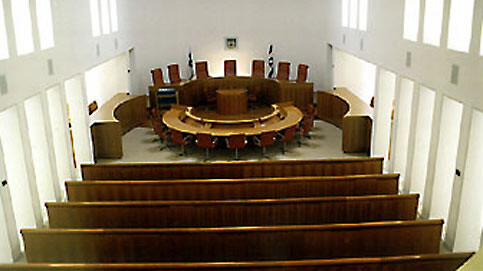Amnesty International 7 October 2005

Courtroom in Israel’s High Court (The Judicial Authority)
Amnesty International welcomes the banning, by Israel’s High Court, of the use of Palestinians as “human shields” by the Israeli army. The long-awaited High Court ruling of 6 October 2005 came in response to a petition filed in May 2002 by several Israeli and Palestinian human rights organizations seeking a ban of the practice, which endangered the lives of the Palestinians who were used as “human shields” and violated international law, notably Article 51 of the Fourth Geneva Convention.
In recent years, Amnesty International investigated tens of cases where the Israeli army used Palestinians, children as well as adults, as “human shields” during military operations in towns and refugee camps throughout the Occupied Territories. Palestinian civilians were forced to walk in front of Israeli soldiers who, at times, fired their weapons while shielding themselves behind the civilians. As well, Palestinian civilians were made to enter houses ahead of Israeli soldiers to check for explosives or gunmen hiding inside, to inspect suspicious objects, to stay in their houses when Israeli soldiers took them over to use as sniper positions, or to enter the houses of wanted, possibly armed, Palestinians to tell them to surrender to Israeli forces.
The High Court failed to rule on the issue for three and a half years after receiving the petition calling for the practice to be outlawed. During this time, the Israeli army continued to use Palestinians as “human shields” and, in response to the petition, claimed that Palestinians were used only to perform tasks to which they agreed and which the military commander deemed safe. The army initially referred to the practice as “neighbourhood procedure” and subsequently as “prior warning procedure”.
In August 2002, the High Court issued a temporary injunction banning the use of Palestinians as “human shields” after a 19-year-old Palestinian was killed while being used in this way by Israeli soldiers, but several months later, in January 2003, the court reduced the scope of the injunction to enable the army to use its so-called “prior warning procedure”.
In practice, however, as Amnesty International and other human rights organizations made clear, Palestinians in the Occupied Territories who Israeli soldiers ordered or asked to carry out certain tasks in support of their military operations were not in a position where they could freely give their informed consent for fear that any refusal would result in punishment or other reprisals. In the meantime, the Israeli army continued to use Palestinian as “human shields”, putting their lives in danger, under the cover of the “prior warning procedure”.
The ban on the use of Palestinians as “human shields” issued by the High Court includes a ban on the use of the so-called “prior warning procedure”, recognizing that the use of civilians in military operations against their will violates international law.
Amnesty International considers the ban a positive development and urges the High Court to now also consider other petitions concerning fundamental human rights, that have been pending for years. These include petitions asking the High Court to outlaw the extrajudicial executions of wanted Palestinians by Israeli forces and a discriminatory law that bars family unification for Israeli citizens who marry Palestinians from the Occupied Territories.
Related Links